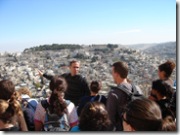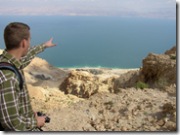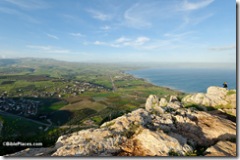I taught my first college-level tours in Israel when I was 21, and for the past 14 years, I have led many student groups of various shapes and sizes. Here are some suggestions that I believe make for a better tour of Israel, with varying applicability depending upon the group.
1. Do the more mentally challenging sites in the morning. Students are more ready to learn when they are less tired. For instance, if you’re visiting the sites north of the Sea of Galilee, I think it’s better to go to Hazor and Dan in the morning and drive across the Golan Heights in the afternoon.
2.  Whenever possible, keep subject-related sites together. For instance, in the Galilee area, I find it best to group the sites related to the life of Christ together on a single day. This is preferable to bouncing back and forth between various periods. This is not always possible, as, for instance, it isn’t practical to visit En Gedi (more OT-related) and Masada (more NT-related) on different days.
Whenever possible, keep subject-related sites together. For instance, in the Galilee area, I find it best to group the sites related to the life of Christ together on a single day. This is preferable to bouncing back and forth between various periods. This is not always possible, as, for instance, it isn’t practical to visit En Gedi (more OT-related) and Masada (more NT-related) on different days.
3. Always prepare the group. Surprises are usually bad. Warn them the day before if the next day is going to be especially physical, or particularly late, or generally boring. Almost more important than reality are the expectations. I can almost make a lame site good just by thoroughly disparaging it in advance!
4. Don’t talk too much. If you do, they won’t hear what is important. The goal is not to show off how much you know but to help them understand.
5. Sometimes less is more. It might be better for the group to skip a site than to squeeze it in. It may be better for you to skip an explanation than to give it.
6. Skip more impressive (non-biblical) remains in favor of a less impressive site with a biblical story. I’ll skip Beth Shearim, but never Tel Jezreel. I’ll skip Sepphoris, but not Nazareth. I’ll skip Avdat, but not Arad.
7. Read the Bible where it happened. Don’t skip this for your explanation. You can’t always read every biblical story on site, but it is better to err on the side of too many than not enough.

8. Don’t be afraid to confess ignorance. If you pretend you know and are then shown to be in error, you lose credibility. If you don’t have credibility, you’re just a chauffeur.
9. Lunch breaks are for eating. When you’re done eating, get moving.
10. Do what the group does, even if you’ve done it a hundred times and hate it. If you skip walking through Hezekiah’s tunnel, or you skip watching the Qumran video, it communicates that this is your job and not your passion.
11. Try hard. They’ll see it and they’ll follow your example.
12. Leave on time. If everyone is not there, leave anyway. If you don’t, they learn that deadlines don’t matter and within a week, you’ll consistently be 15 minutes (or more) late leaving everywhere. And then you miss cool things or won’t be able to do #7.
13. Wait for the group. When you’re at a site, wait until everyone catches up before beginning the explanation. This communicates that what you say is important, and it reduces the number of questions about the things you already said.
14. Give them time to take pictures after the explanation. If you don’t, they’ll take pictures when you’re teaching and they won’t be listening.
15. Love what you do. For me this means not giving tour after tour after tour. If I do, I am not excited anymore. Many tour guides are boring because they are bored. And no wonder, when they do the same tired itinerary week after week.
16. Different guides have different priorities that define the day. Here are some of mine:
- The first view of the Sea of Galilee is from Arbel, always in the afternoon. This creates a lasting memory.

- Take a boat ride on the Sea of Galilee in the afternoon. This is a good change of pace, and afternoons need changes of pace more than mornings. In the summer, it’s a refreshing break from the heat.
- Visit Mount Carmel (Muhraqa) in the afternoon. It is one of the top three views in the country and there is often poor visibility in the morning.
- I never skip the Cove of the Sower, even though it’s become more difficult over the years. There’s less traffic early in the morning.
- I like to visit Cave 1 at Qumran, especially since very few people know where it is.
10 thoughts on “Touring Israel: My Approach”
I’ve never been to Israel and I’ve had a desire to go for a long time. However, there are a couple of issues (besides money). My wife is concerned about safety is one. The other is choosing a good tour group to go with…one that will focus on Biblical history based upon solid scholarship. Do you have any recommendations?
Hi Todd,
Thanks for this post. We crossed paths a few times during my summer studies at JUC. Keep up the good work on your blog and your pics!
Jimmy – It seems to me the best academic trips in Israel are those with Todd or Jerusalem University College. And I hope you can talk your wife into going!
Zac
Thanks for the follow up. I’m sure if I go my wife will come with me. The truth is that (at 36) I’m just now picking up graduate work and would love just to go to school in Israel…but that’s VERY unlikely.
Jimmy – any trip is better than no trip. And it certainly is safe. There are dangerous areas, but you won’t know it if you’re on a tour. My kids were born here and in their minds it’s as safe to them as it was for me as a kid growing up in the Los Angeles suburbs – there is danger but it’s far from where we were/are. I would agree with Zac – check out the three-week academic program at http://www.juc.edu. It’s worth whatever sacrifice.
Jimmy,
I didn’t “pick up graduate work” until more than 30 years after I got my BS, so hang in there: it can be done! We crammed a 2-yr Masters into only 7 years of weekend classes.
My wife and I took a DTS study tour that Todd taught, and hope to do another. I believe a good guided trip like Todd leads is as safe as a travel in the US.
My son took the equivalent course at JUC several years ago when most cancelled due to safety concerns, but found (as we did) that news reporting gives a distorted view. (They could do the same to Dallas: “Don’t go there – Kennedy was shot…”)
By all means take your wife and do a real academic/class tour. You will see the Scriptures more accurately.
Great list, Todd. A lot of wisdom there.
Hi Todd,
I’m a DTS alum who went with you to Israel in May 2001. That 3 week trip was the highlight of my seminary education and I can’t imagine teaching the Bible the next 30 years without seeing the Holy Land the way I did with you. Thanks!
Now, I have a sabbatical coming up and would like to do a footsteps of Paul tour. Any recommendations of tour companies…this will be for summer 2008.
Thanks and I love your blog!
David – thanks for the comment. I would suggest you check with Dr. Tom Halstead at The Master’s College (www.masters.edu) or Mark Wilson of the Seven Churches Network (www.sevenchurches.org/) for possibilities.
Hi Todd,
I would like to visit Israel and go on a tour to see the places where The Lord walked. I don’t think I understand, do you offer tours to those who are not students of JUC? Where can I go for a reputable tour of the Holy Land, and how soon? Thank You
Patrick – at present I personally am only leading tours for students at schools with which I am associated – The Master’s College and Dallas Theological Seminary. But there are many good options out there, including http://www.juc.edu for a study-type trip. A U.S. company that offers tours to Israel is http://www.morningstartours.com. And there are many other ways.